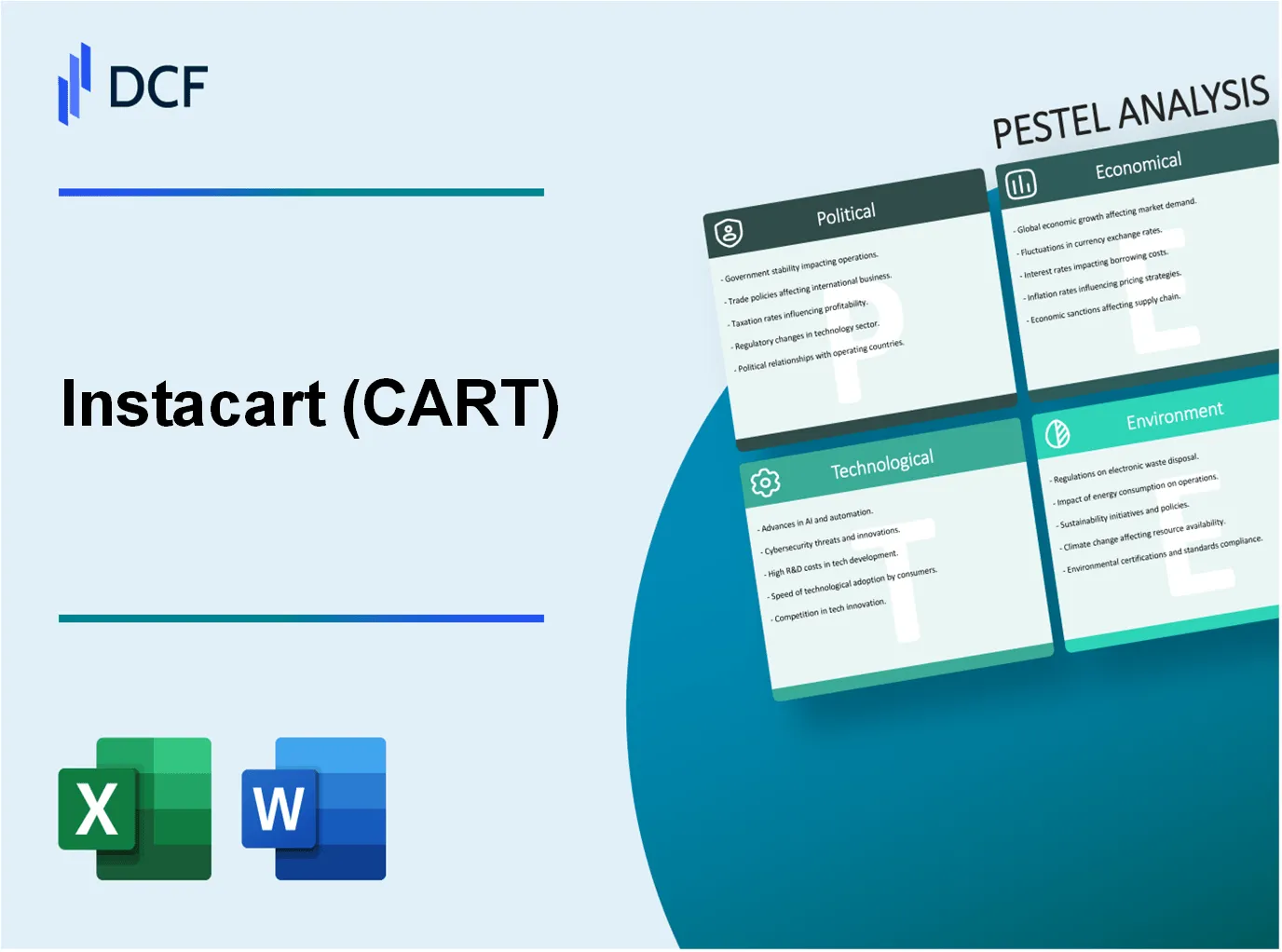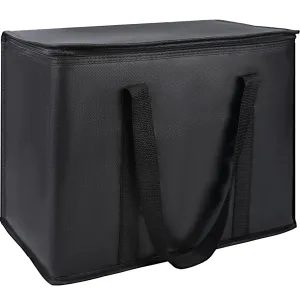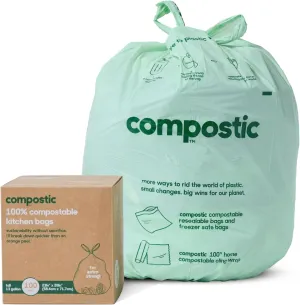In the rapidly evolving landscape of grocery delivery, Instacart (Maplebear Inc.) navigates a complex web of factors that shape its business environment. From political nuances to technological advancements, understanding the PESTLE dynamics is essential for investors and industry enthusiasts alike. Dive in as we dissect the critical elements influencing Instacart’s operations and market strategy, shedding light on the challenges and opportunities ahead.
Instacart (Maplebear Inc.) - PESTLE Analysis: Political factors
Government regulations on e-commerce have evolved significantly, especially in the wake of the pandemic. In 2022, the U.S. e-commerce market was projected to reach $1 trillion for the first time, driven by an increase in online shopping. However, various regulations such as data privacy laws and consumer protection regulations are being implemented. For example, the California Consumer Privacy Act (CCPA) enforced stricter rules on how companies handle consumer data, impacting companies like Instacart.
Labor laws are increasingly impacting gig economy workers. In 2020, California passed Proposition 22, which allowed companies like Instacart to classify drivers as independent contractors. Despite this, various states are proposing legislation to enhance protections for gig workers. As of 2023, over 15 states are considering similar laws that could affect how Instacart manages its workforce. The financial implications are significant, as classifying workers as employees could increase labor costs by up to 30%.
Trade policies also affect product availability for Instacart. The ongoing U.S.-China trade tensions have led to tariffs that can increase costs for imports. For instance, tariffs on certain goods can reach as high as 25%, affecting the pricing strategy for products sold through Instacart. In 2022 alone, imports from China to the U.S. were valued at approximately $506 billion, with substantial portions of these goods being food and household items that Instacart delivers.
Political stability is crucial for market expansion. The U.S. has historically been viewed as a stable market, but rising political polarization and legislative gridlock can pose risks. In 2022, the U.S. ranked 27th in the Global Peace Index, affecting investor confidence. Political instability can result in fluctuating stock prices, impacting Instacart's market performance and expansion opportunities.
| Factor | Description | Statistical Impact |
|---|---|---|
| Government Regulations | New e-commerce laws and consumer data protections | U.S. e-commerce market projected at $1 trillion in 2022 |
| Labor Laws | Impacts of gig worker classifications | Labor costs could increase by 30% if reclassified |
| Trade Policies | Tariffs impacting import costs | Tariffs can reach up to 25% on certain goods |
| Political Stability | Influence on market expansion and investor confidence | Global Peace Index ranking of 27th in 2022 |
Instacart (Maplebear Inc.) - PESTLE Analysis: Economic factors
Fluctuations in consumer spending power have a direct impact on Instacart's business. As of Q2 2023, U.S. consumer spending grew by 1.1%, but inflation has significantly affected real purchasing power. For instance, the personal savings rate decreased to 4.6%, the lowest since 2008, which indicates consumer caution in spending.
The cost of living changes have also influenced demand for grocery delivery services. The Consumer Price Index (CPI) for food at home rose by 17.1% from 2021 to 2023, prompting consumers to be more price-sensitive. This leads to increased competition for Instacart as consumers seek cost-effective alternatives.
Moreover, inflation rates have impacted operational costs. As of August 2023, the inflation rate in the United States was reported at 3.7%. This inflation has raised costs associated with transportation, labor, and materials. For instance, the average cost of fuel, which is critical for delivery services, rose to approximately $3.80 per gallon, compared to $3.35 in the previous year.
| Economic Indicator | Value (2023) |
|---|---|
| U.S. Consumer Spending Growth | 1.1% |
| Personal Savings Rate | 4.6% |
| Food at Home CPI Increase | 17.1% |
| U.S. Inflation Rate | 3.7% |
| Average Fuel Cost | $3.80 per gallon |
Finally, the competition from other grocery delivery services is intensifying as economic conditions force consumers to make more value-based decisions. Noteworthy competitors include Amazon Fresh and Walmart Grocery, both of which have seen significant growth in market share due to aggressive pricing and brand loyalty initiatives.
As of late 2023, Instacart commands approximately 47% of the U.S. online grocery market share, but it faces mounting pressures from rivals that are similarly capitalizing on changing economic conditions. This competitive landscape demands that Instacart innovate and adapt to maintain its consumer base amidst economic challenges.
Instacart (Maplebear Inc.) - PESTLE Analysis: Social factors
Increased demand for convenience-based services: The global online grocery market was valued at approximately $250 billion in 2022 and is projected to reach around $1 trillion by 2027. Instacart has capitalized on this trend, reporting a significant increase in user engagement. In Q2 2023, Instacart reported 25 million monthly active users, an increase from 16 million in 2020.
Growing health consciousness driving product choice: A survey conducted by the International Food Information Council in 2023 indicated that 77% of consumers are more health-conscious now than in previous years. Subsequently, Instacart has noted a 30% increase in the sales of organic products between 2021 and 2023. This trend is reflected in their offerings, with over 300,000 organic products available on their platform.
Demographic shifts affecting consumer base: As of 2023, Millennials and Gen Z together represent over 50% of the consumer base for online grocery services. Instacart reported that users aged 18-34 represent the fastest-growing demographic, with a 40% increase in usage over the last two years. Additionally, the U.S. Census Bureau indicates that by 2030, the number of adults aged 65 and older will surpass 70 million, influencing demand for delivery services among older populations.
Urbanization boosting delivery service usage: According to the United Nations, by 2025, about 68% of the world’s population is expected to live in urban areas. Instacart's services are predominantly used in urban settings, with 80% of its orders coming from metropolitan areas. In 2022, Instacart expanded its reach to over 5,500 cities in the U.S. and Canada, highlighting the impact of urbanization on its service adoption.
| Social Factor | Statistical Data | Year |
|---|---|---|
| Global Online Grocery Market Value | $250 billion (projected $1 trillion) | 2022-2027 |
| Monthly Active Users | 25 million | Q2 2023 |
| Increase in Health-Conscious Consumers | 77% | 2023 |
| Sales Increase of Organic Products | 30% | 2021-2023 |
| Consumer Age Demographics (18-34) | 40% increase in usage | Last 2 years |
| Projected Older Adult Population | 70 million | By 2030 |
| Urban Population Expectation | 68% | By 2025 |
| Instacart City Reach | 5,500 cities | 2022 |
Instacart (Maplebear Inc.) - PESTLE Analysis: Technological factors
The landscape of technology plays a pivotal role in shaping Instacart's business operations and growth potential. Several key technological factors contribute to its competitive edge and operational efficiency.
Advances in app development and AI
Instacart leverages advanced app development techniques, including machine learning (ML) and artificial intelligence (AI), to enhance user experience. In 2023, Instacart reported that its app had over 750,000 active monthly users, demonstrating a significant increase in customer engagement.
The application employs AI algorithms to provide personalized shopping recommendations, contributing to increased basket sizes. Instacart's AI-generated recommendations were reported to boost user conversion rates by up to 30%.
Cybersecurity measures and user data protection
Data protection is critical for Instacart, particularly with the increasing number of cyber threats. In 2023, the company invested approximately $23 million in enhancing its cybersecurity infrastructure. This funding focused on deploying advanced encryption protocols and multi-factor authentication mechanisms.
According to the company, over 80% of their user data is now secured using advanced encryption, significantly reducing the risk of data breaches.
Integration of IoT in delivery logistics
Instacart is incorporating the Internet of Things (IoT) technologies into its delivery logistics to streamline operations. The company has partnered with leading IoT providers to enhance real-time tracking of deliveries, with IoT devices deployed in delivery vehicles offering route optimization.
This initiative is projected to increase delivery efficiency by 25%, as highlighted in Instacart's logistics operational report from Q2 2023. The integration of IoT also aims to reduce the average delivery time from 45 minutes to 30 minutes.
Dependence on internet infrastructure reliability
Instacart's operations heavily rely on internet infrastructure, as a stable connection is essential for real-time order processing and customer interactions. As of 2023, Instacart reported a system downtime of less than 0.5% across its platform. This reliability is a crucial competitive advantage in the e-commerce space.
Furthermore, they have optimized their cloud infrastructure, resulting in a reduction in latency by 10 milliseconds, leading to faster load times for users.
| Technological Factor | Metric | Value |
|---|---|---|
| Active Monthly Users | Users | 750,000 |
| AI-Generated Recommendation Impact | Conversion Rate Increase | 30% |
| Cybersecurity Investment | Amount | $23 million |
| User Data Encryption | Percentage of Data Secured | 80% |
| Delivery Efficiency Improvement | Projected Increase | 25% |
| Average Delivery Time Reduction | Minutes | 15 minutes |
| System Downtime | Percentage | 0.5% |
| Cloud Infrastructure Latency Reduction | Milliseconds | 10 ms |
Instacart (Maplebear Inc.) - PESTLE Analysis: Legal factors
Compliance with consumer protection laws is paramount for Instacart. The Federal Trade Commission (FTC) oversees and enforces these laws, ensuring that consumers are not misled in advertising and have access to accurate information about products and services. In 2021, the FTC prioritized investigations into deceptive practices in online marketplaces, which included a focus on delivery services. Companies failing to comply faced penalties that could reach up to $43,792 per violation.
Moreover, California's Proposition 65 requires companies to provide warnings about significant exposures to chemicals known to cause cancer, birth defects, or other reproductive harm. This regulation can impact Instacart’s operations in California, where it generated approximately $1.6 billion in sales in 2022.
Data privacy regulations impact Instacart significantly. The General Data Protection Regulation (GDPR) in the EU mandates strict guidelines for how companies handle personal data, imposing fines up to 4% of annual global revenue for breaches. In 2022, Instacart reported revenues of approximately $2 billion, resulting in a potential fine up to $80 million if found in violation. Similarly, the California Consumer Privacy Act (CCPA) gives consumers more control over their personal data. Violation of CCPA can lead to fines up to $7,500 per violation.
| Data Privacy Regulation | Potential Penalty | Current Compliance Status |
|---|---|---|
| GDPR | Up to 4% of annual global revenue | Compliant |
| CCPA | Up to $7,500 per violation | Compliant |
Intellectual property rights for technological tools are crucial in maintaining Instacart's competitive edge. The company relies on proprietary algorithms for optimizing delivery logistics and customer recommendations. In 2023, Instacart applied for several patents, including one for a predictive analytics tool aimed at enhancing customer experience. The potential market for AI-driven applications in e-commerce is projected to reach $40 billion by 2025. Failure to protect these intellectual properties could result in substantial revenue loss.
Legal challenges from labor classification of workers have been a contentious issue for Instacart. The classification of gig workers as independent contractors versus employees influences operational costs significantly. As of 2023, lawsuits regarding worker classification in California resulted in settlements exceeding $100 million for other companies in the gig economy. Instacart has faced similar scrutiny, and various states, including New York and Illinois, are considering legislation that could impact its operational model. The potential implications include increased labor costs, which could rise by approximately 30% if workers are classified as employees.
| Legal Challenge | Potential Financial Impact | Status |
|---|---|---|
| Worker Classification Lawsuit | Settlements exceeding $100 million | In negotiations |
| Legislation in NY and IL | 30% increase in labor costs | Pending |
Instacart (Maplebear Inc.) - PESTLE Analysis: Environmental factors
In recent years, sustainability expectations from consumers have reached unprecedented levels. According to a 2022 survey by Accenture, 83% of consumers believe that companies should be actively working to reduce their environmental impact. This trend has prompted Instacart to integrate sustainability practices into its operations, responding to an increasing demand for eco-friendly solutions. This includes investments in green technologies and partnerships with brands committed to sustainability.
The carbon footprint associated with delivery operations is a critical consideration for Instacart. In 2022, delivery services in the U.S. contributed to approximately 20% of total transportation-related greenhouse gas emissions. A report by the Environmental Protection Agency indicated that the average delivery vehicle emits about 404 grams of CO2 per mile. Instacart has initiated efforts to mitigate this by optimizing delivery routes and utilizing electric vehicles in certain markets.
| Delivery Vehicle Type | Average CO2 Emissions (grams per mile) | Estimated Miles Driven (2022) | Total CO2 Emissions (tons) |
|---|---|---|---|
| Gasoline | 404 | 5,000,000 | 1,010 |
| Electric | 0 | 1,000,000 | 0 |
Instacart has also faced growing packaging waste management obligations. In 2021, it was estimated that online grocery shopping generated over 1.6 million tons of packaging waste in the U.S. alone. The company has responded by collaborating with suppliers to reduce excessive packaging and investing in materials that are recyclable and biodegradable. In addition, Instacart has promoted reusable bags, aiming to reduce single-use plastics.
The impact of climate change on supply chain logistics is another critical factor for Instacart. A report by the World Economic Forum noted that climate change could disrupt global supply chains, potentially increasing operational costs by 20% by 2030. Extreme weather events, such as floods and heatwaves, can lead to delays and increased transportation costs. Instacart is actively developing contingency plans to address these challenges, including diversifying suppliers and enhancing inventory management systems to better align with shifting climate patterns.
The PESTLE analysis of Instacart (Maplebear Inc.) highlights the multifaceted challenges and opportunities the company navigates in today’s complex landscape. By staying attuned to political trends, economic fluctuations, sociological changes, technological advancements, legal requirements, and environmental expectations, Instacart can strategically position itself to thrive in the competitive grocery delivery market.












